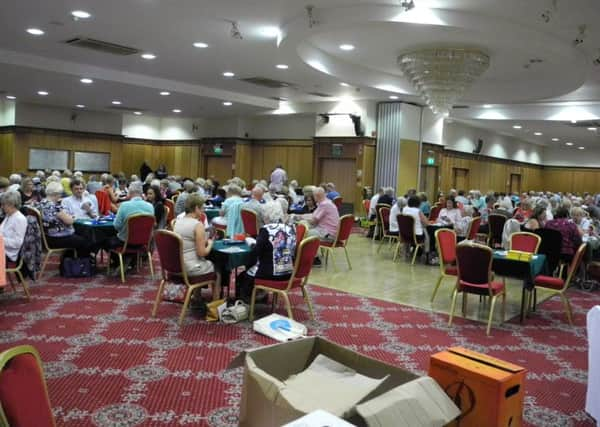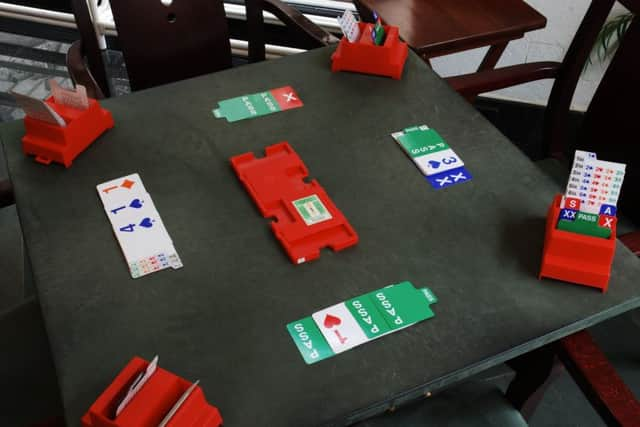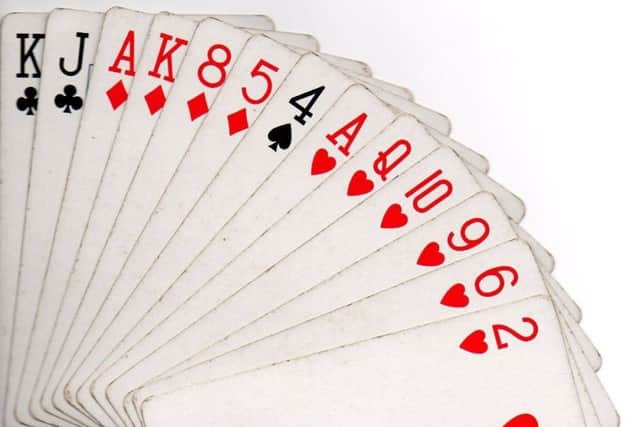Card game seeking to '˜bridge' age gap in Northern Ireland


There are at the very least 2,000 people in Northern Ireland reaping the mathematical, psychological and social benefits of the game of bridge.
However, most of the top players in the Province do not have age of their side.
Advertisement
Hide AdAdvertisement
Hide AdIt is something the Northern Ireland Bridge Union (NIBU) is trying to address.


Giving an overview of the bridge in the Province, NIBU secretary Michael McFaul said: “Around the 1930s there was a worldwide boom in bridge. It just took off everywhere. I’m not sure of the exact dates, but there was two unions set up in Ireland.
“In the south of Ireland there was the Contract Bridge Association of Ireland (CBAI), we have the Northern Ireland Bridge Union. There’s also a third body called the Irish Bridge Union and that exists to select teams for European and International events.
“A bit like the rugby it doesn’t recognise the two separate jurisdictions. They insist there has to be an all-Ireland team.
Advertisement
Hide AdAdvertisement
Hide Ad“I’ve never played for the all-Ireland team. I’ve never quite reached those pinnacles. You need to be at almost professional level to be as good as that.


“Down south they have a much bigger playing population than us.”
Asked what makes a good bridge player, the 68-year-old from Carrickfergus said: “What used to happen, a lot of people used to come to bridge from playing chess at school or university.
“I used to play chess for Queen’s University then I started playing bridge and I realised there was so much more to bridge.
Advertisement
Hide AdAdvertisement
Hide Ad“When you’re playing chess you’re trying to project ahead. That’s what it comes down to, how far you can project ahead. With bridge there’s so many different skills involved. You need to have mathematical ability to work out percentages and probabilities, you need to have a very strong psychological insight.
“You’re playing with a partner against two other people. You’re watching to see how they react to certain things – why people do things, why they don’t do things.
“There’s strong social skills as well because you’re playing with so many people in tournaments.”
He added: “You would usually bridge players are people who are orientated towards mind games, people who have played chess, people who like puzzles and logic.
Advertisement
Hide AdAdvertisement
Hide Ad“You need to be able to think quite deeply, to focus, to hold your concentration.
“A lot of the serious players would keep the same partner. You have to develop a system for understanding and bidding and that sort of thing.”
Michael explained that becoming a good player isn’t something that happens overnight: “It takes quite a while to pick up, you can’t expect to be a good player within a week or two. It normally takes about six months before you can play a decent enough game.
“It takes several years before you reach the pinnacle. You never stop learning.
Advertisement
Hide AdAdvertisement
Hide Ad“The thing that makes bridge such a fascinating game, unlike chess where you always start from exactly the same position, in bridge it’s a randomised game, you never know what hand you’re going to be dealt, your job is to deal with the hand you’ve been given.”
There are 42 affiliated bridge clubs throughout NI as well as clubs and players who are not registered with NIBU.
Michael, who is a member of Kelvin Malone Bridge Club based in Belfast’s Harbour Estate said: “Some of the country clubs are very small, maybe only 30 members, the biggest clubs – the likes of Derryvolgie and Kelvin Malone – they would have several hundred members.
“Overall there are 2,000 affiliated members. It’s still only £5 for membership.”
Advertisement
Hide AdAdvertisement
Hide AdHe said: “We try to encourage as many people who take it up to play seriously.
“It’s harder to get young people playing. We’ve started a campaign to get bridge introduced in schools.
“It has increasingly become a game for older people. We have a tournament for over 60s and it’s nearly the same as the open events.
“At the minute there’s an awful lot of people start bridge when they retire. It’s too late to become a really strong player. They’re happier to just play socially. We want to get people to be more competitive. That’s our biggest challenge at the moment.
Advertisement
Hide AdAdvertisement
Hide Ad“It used to be people would start at university, but there’s so many distractions now, especially online. The good thing is bridge is now online too.”
In order to attract younger bridge players – and teach them some important life skills – Northern Ireland Bridge Union are introducing the game to primary school children.
Among the schools taking part in the initiative are Greenisland PS and Eden PS in Carrickfergus, St Mary’s On The Hill PS in Glengormley and Strandtown PS in Belfast.
NIBU are also involved in teaching bridge to older pupils at Carrick Grammar, Belfast Royal Academy and Bangor Grammar.
Advertisement
Hide AdAdvertisement
Hide AdOne of the NIBU members helping to organise the bridge lessons is Norman Lacy. He said: “We’re actually coming in to do the lessons to P7 pupils during class time.
“There are so many benefits. During bridge you have to do some mental arithmetic.
“It also uses concentration and memory. When you start playing there’s 52 cards that come out and you have to remember what cards have been played.
“There’s learning to trust your partner. You have to work with your partner and build up a rapport with them.
Advertisement
Hide AdAdvertisement
Hide Ad“The government is trying to get away from the amount of screen time children spend, this is relevant to that as well.”
He added: “There’s very much a social side, you make an awful lot of close friends through bridge.
“I’ve become very close friends with my partner Dan in the four years that we’ve been playing. We met in the same (bridge) class.”
Norman, who is 73 and from Carrickfergus, said: “I took it up quite late. Now there are three generations of our family playing bridge.
Advertisement
Hide AdAdvertisement
Hide Ad“My grandson Craig Smylie (21) is a junior international player. His brother Michael (24) only started a year ago and is a very good player as well.”
Norman said: “It’s difficult to get the younger generations coming through. That’s what we’re working at by getting the schools involved.
“In terms of the older generation there is a lot of bridge played at the University Of The Third Age. It helps prevent the onset of dementia because it keeps your brain very active.”
Bridge is described by NIBU’s Michael as “a much more complex version of whist”.
Advertisement
Hide AdAdvertisement
Hide AdA deck of 52 cards is dealt to the four players, each receiving 13 cards. The players then bid in pairs to take control of the game based on their cards’ scoring power.
The pair who win the auction then have to fulfil their contract (the number of tricks they’ve pledged to win), while the other pair become defenders, trying to stop them from doing so.
Michael said: “There’s a complicated scoring system and there’s several different versions of the game. The biggest breakthrough in recent years is being able to play online. The computer does the maths for you and you can take tutorials to learn to play.”
So how long does a game of bridge last?
Fellow NIBU member Norman said: “If you were playing in a session you’d maybe play 20 hands in two hours. You’d get about 20 games for an evening’s entertainment. When you’re learning it takes a lot longer.”
He added: “It’s very much a game which attracts people from right across the community.”
Outside NI, Stirling University are running a PhD in Bridge led by Professor Samantha Punch.
